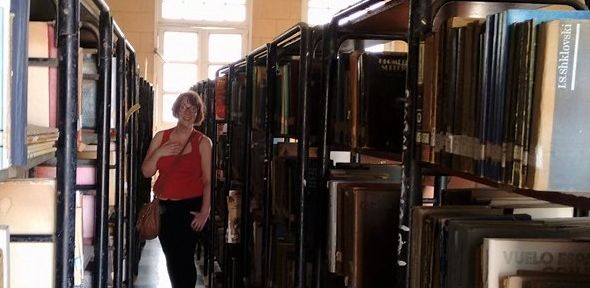
Rosanna Hunt
rh649@cam.ac.uk
College
King's College
Position(s)
Postdoctoral affiliate, MMLL
Member of the tutorial committee and external reader, Patrimonio y Cultura para la Paz, Unidad Académica de las Humanidades, La Universidad Autónoma de Zacatecas, Mexico
About
Rosanna (Rosie) Hunt holds a PhD in Spanish and Portuguese, awarded by King's College, Cambridge. She has a special interest in the representation of the 'state' and 'counter-state' in contemporary Peruvian and Colombian literature. Drawing on anthropological theories on the state, her work is focused on representation of violent agents in novels of conflict, and their implications for the relationship between author and state. Her next project will examine ways in which the affective powers of horror cinema and theatre, with all its excesses and celebrations of mutilation and death, have resisted and even flourished under regimes of routine terror in contemporary Mexico and Colombia. The study mixes theatre studies, film studies and ethnographic study of horror events to ask, in Latin American environments of state and narco-terror, how is popular culture used to re-establish bodily sovereignty under violent regimes. Rosanna was awarded the Nicholas Round Prize (2014) for her work on code-switching in Latin American literature, and holds an MA in Social Anthropology from the University of
Manchester and a BA in Hispanic Studies from the University of Sheffield. She is co-founder of the Peruvian Research Network of the UK and Ireland.
Research
Topic: State imaginaries in Peruvian and Colombian conflict narratives
Through my reasearch, I seek to create a new framework for approaches to the state and sovereignty in cultural studies, by drawing on both political philosophy and social/cultural anthropology of the state. This project takes as its focus the Peruvian and Colombian civil conflicts during the later part of the twentieth century, given both their historical moment, bridging the close of the Cold War. The conflicts are only significant to my interest in 'state imaginaries' for their range of actors, particularly paramilitary and guerrilla groups, as well as narcotraffickers, who often behave in state-like wars, with regards to the use of force as law-making and upholding and the deployment of regulatory and social functions, including taxation and education. Given this project’s consideration of conflict and violent state and counter-state actors through cinema and fiction, my research also inevitably asks questions of the role of authors, narrators and characters in contributing to the construction and reification of the ‘state’ and ‘sovereign’ in the inscription of areas and experiences of civil conflict.
Through analysis which juxtaposes the guerrillero with the soldier as figures upon which state and shadow/counter-state imaginaries might be mapped, and juxtaposes state imaginaries and formations in rural and urban spaces, my thesis aims to re-situate memory struggles in conflict literature against questions of violence, legitimacy and sovereignty, not only of the victim, but of the victimiser.
Research Interests
Civil and guerrilla conflicts
State theory
Horror cinema
Peru
Colombia
Mexico
Recent Research Projects
‘Fragmentary States: A Study of Power in Conflict Narratives from Peru and Colombia’ Funded by the Cambridge Trust Forthcoming as a monograph
‘Agency and horror culture in Latin American regimes of terror
Conference Papers
'From Victimiser to Victim: Imagining the violent agent post-conflict in contemporary Latin American cinema’. Of Survival and Struggle: Creative and Critical Responses to Structural and Long-term Violence in the Public Sphere (Colloquium). June 7th, 2018. Queen Mary University of London
'The Mausoleum and the Prison: material and literary sites for the reclamation of the citizenship of the senderista’. Radical Americas 2017
Conference: Legacies, 11th-12th September 2017, University College, London
‘The Terrorist in the Archive: writing and reclaiming the senderista as subject’. PILAS Annual Conference 2017: “Discontinuities and Resistance in Latin America”, 26th-27th June 2017, University of Leeds
Teaching
SP1
SPA2
SPB2
SPA3
SP5
SP13
YAP/Dissertatio
Publications:
‘Necropolitics in the Andes: Reading the Senderista as Sovereign Subject or as Subject of Sovereignty in two Peruvian Novels’ Bulletin of Spanish Studies. (Forthcoming Autumn 2020)
Review of Palma Africana, by Michael Taussig. Bulletin of Latin American Research (Nov, 2019) pp. 691-2
'New Approaches to Bodily Provocation in Hispanic Narratives' Chasqui 48.2 (May, 2019) pp. r1-r
Other responsibilites:
Co-founder of the Peruvian Research Network (UK and Eire)


